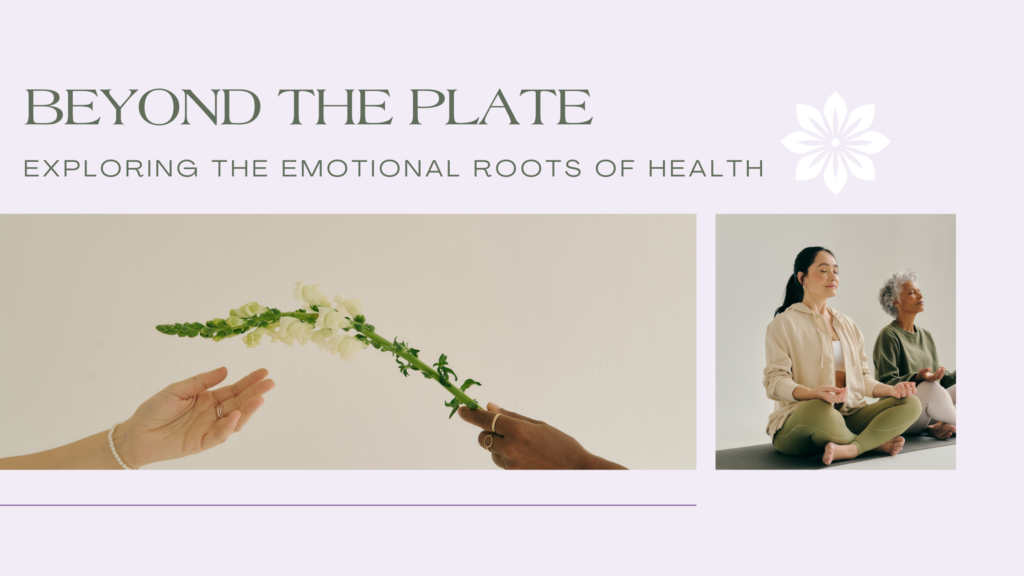In the quest for optimal health, we often overlook the profound connection between our emotional well-being and physical vitality. As a holistic health practitioner, I’ve witnessed firsthand how emotions serve as the foundation of many health issues, manifesting as lifestyle diseases and gut imbalances. Let’s delve into this intricate relationship and explore how an integrated approach to nutrition and emotional wellness can pave the path to holistic healing.
The Interplay of Emotions and Health
Consider the case of one of my patients who struggled with high blood sugar amidst a tumultuous period in her life. Battling low self-esteem, weight gain, caregiving stress, and financial worries, her emotional turmoil manifested as physical symptoms. Through a combination of nutritional counseling and emotional healing with flower therapy, she experienced a transformative journey towards confidence and positivity, ultimately regaining control over her sugar levels.
Recognizing the Root Causes
It’s imperative to recognize that our modern lifestyle, characterized by poor nutrition, erratic schedules, and chronic stress, sets the stage for a myriad of health issues. More than 95% of individuals who come to me seeking emotional healing harbor lifestyle diseases, emphasizing the intimate link between emotional well-being and physical health.
Hence getting to the root cause on the physiological and emotional level is important. A detailed history of not only the dietary habits, but also the emotional status, the physiological constitution, history of illnesses, emotional status, personality traits all play an important role in this. All this is the part of history taking.
Redefining Health Care
Many a times, the approach to health care often focuses solely on treating diseases rather than fostering holistic well-being. True health care entails nurturing our physical, mental, and emotional selves proactively, rather than waiting for ailments to surface. Just as we service our vehicles pre-emptively to prevent breakdowns, so too must we prioritize self-care and emotional resilience to safeguard our health.
The WHO Definition of Health
The World Health Organization (WHO) defines health as a state of complete physical, mental, and social well-being, not merely the absence of disease. This underscores the importance of addressing emotional health as a cornerstone of overall well-being. An important implication of this definition is that mental health is more than just the absence of mental disorders or disabilities. **
Where is the change needed?
Cultivating change from within is the answer. Initiating change begins with a shift in mindset. Merely eradicating darkness does not equate to light, just as the absence of disease does not signify good health. We must invest in our health with the same diligence as we do in financial savings, prioritizing nutrition, lifestyle habits, and emotional well-being as integral components of our holistic health plan.
An integrated approach to health encompasses nutrition, lifestyle adjustments, and emotional well-being. Returning to the basics of nutrition, embracing mindful eating practices, and restoring balance to our circadian rhythms are essential steps in nurturing our bodies. Simultaneously, addressing lifestyle factors such as work-life balance and motivation, alongside emotional stressors, through therapies like Flower therapy can foster comprehensive healing.
Embracing Mind-Body-Spirit Harmony
In conclusion, achieving harmony in health requires a multifaceted approach that acknowledges the interconnectedness of our physical, emotional, and spiritual selves. By integrating nutrition, lifestyle modifications, and emotional healing into our wellness journey, we can cultivate a profound sense of balance and vitality that transcends mere absence of disease. Let’s embark on this transformative journey together, embracing the power of holistic healing to enrich our lives and nurture our well-being.
It’s time we think beyond our plate to balance our lives. Go beyond the counting of calories, proteins and think ourselves as persons as a whole.
** https://www.who.int/data/gho/data/major-themes/health-and-well-being

